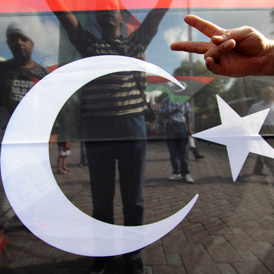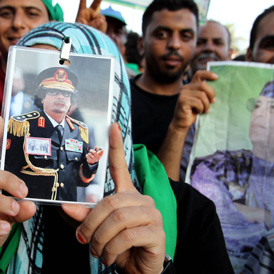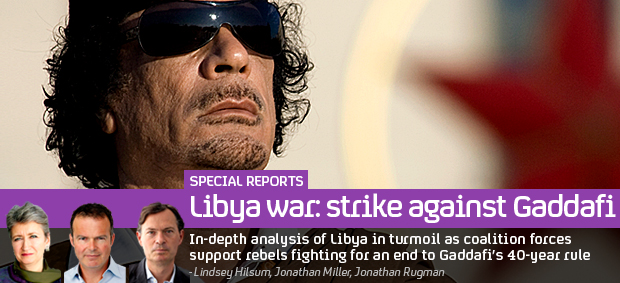Gaddafi could stay in Libya ‘if he gives up power’
Libyan leader Colonel Gaddafi could stay in the country as long as he relinquishes power, according to Foreign Secretary William Hague.

William Hague said Colonel Gaddafi‘s fate was “a question for the Libyans” and not for other countries to decide.
However, he said it would be best if the Libyan leader did leave the country – and added that the British Government supported the International Criminal Court (ICC) which issued a warrant for his arrest at the end of June.
It also cites Gaddafi’s son Saif al-Islam, and his brother-in-law and intelligence chief Abdulla al-Senussi, as being responsible for crimes against humanity, including “shooting civilians on the streets and persecuting alleged dissidents in their homes”.
Mr Hague would not be drawn on the implications for the ICC of allowing Gaddafi to stay in Libya, dismissing the prospect as a “hypothetical route”. The ICC has previously called on fellow Libyans, and even Gaddafi’s “inner circle”, to implement the arrest warrant.
Gaddafi can stay in Libya but it will have conditions. Rebel leader
Mr Hague was supported in his comments by his French counterpart Alain Juppe, who said the UK and France were working along “exactly the same lines”.
“If we had not intervened four months ago, it would have been a massacre in Benghazi, and I think we may be proud to have taken this courageous decision,” Mr Juppe said.
“We are absolutely clear that at the end of the day, Gaddafi is going to have to abandon power, all military and civil responsibility, and then it will be for the Libyan people themselves to decide what (his) fate will be – either inside Libya or outside Libya.”
Gaddafi has managed to keep hold of power, despite five months of fighting with rebels in the country and four months of a Nato air campaign. Britain has said strikes will not be suspended during the Muslim holy month of Ramadan, which begins at the start of August.
"Behind the scenes amongst the NATO allies, there is a sense of intervention fatigue. This is adding to a growing urgency in finding a negotiated solution, especially if the rebels cannot force the issue by weight of arms alone."
Anthony Tucker-Jones analyses the shifting sands and comes to the conclusion that Pragmatism rules in Libyan stalemate.

Bombing campaign continues
On Monday, the Ministry of Defence (MoD) said Nato planes had bombed a “key intelligence building” after a strike on the Central Organisation for Electronic Research.
The building has been described by the Libyan authorities as an engineering academy, but the MoD insisted it was a legitimate target as it had long been a “cover for the regime’s nefarious activities”.
Meanwhile, rebels have seized large parts of the country, and the Benghazi-based rebel council has recently held talks with the United Nations envoy to Libya.
Abdul Elah al-Khatib travelled to Tripoli on Tuesday for talks with the Libyan government. He said discussions with the rebels included “ideas on how we can trigger a political process to achieve a political solution”.
Leader of the rebel Transitional National Council, Mustafa Abdel Jalil, told the Wall Street Journal they might be willing to accept Gaddafi staying in the country as long as he gave up power.
“Gaddafi can stay in Libya but it will have conditions,” he reportedly said. “We will decide where he stays and who watches him. The same conditions will apply to his family.”
